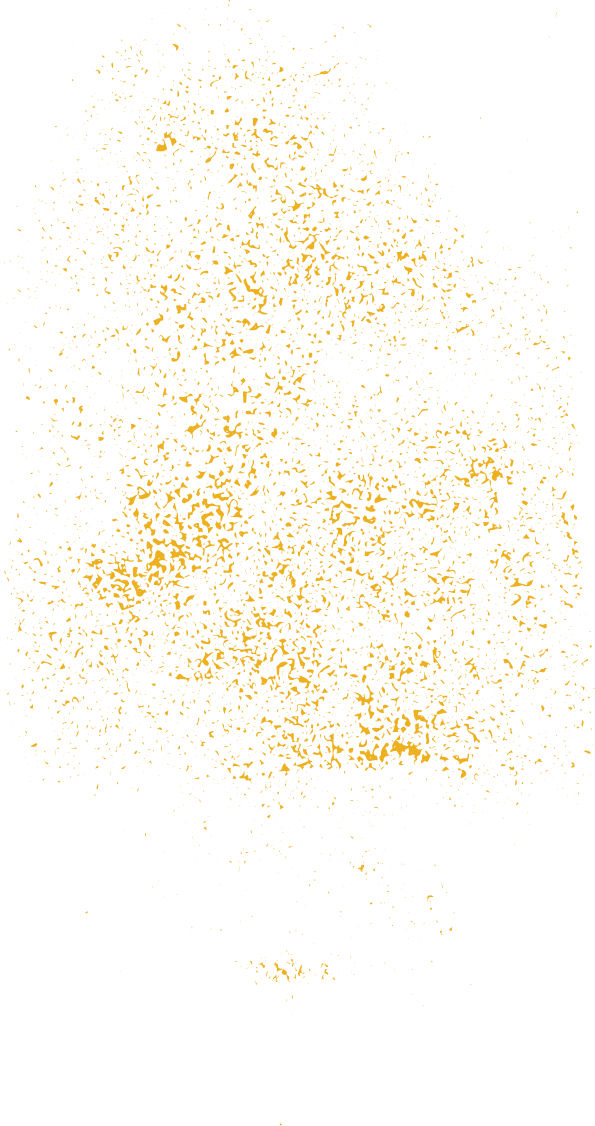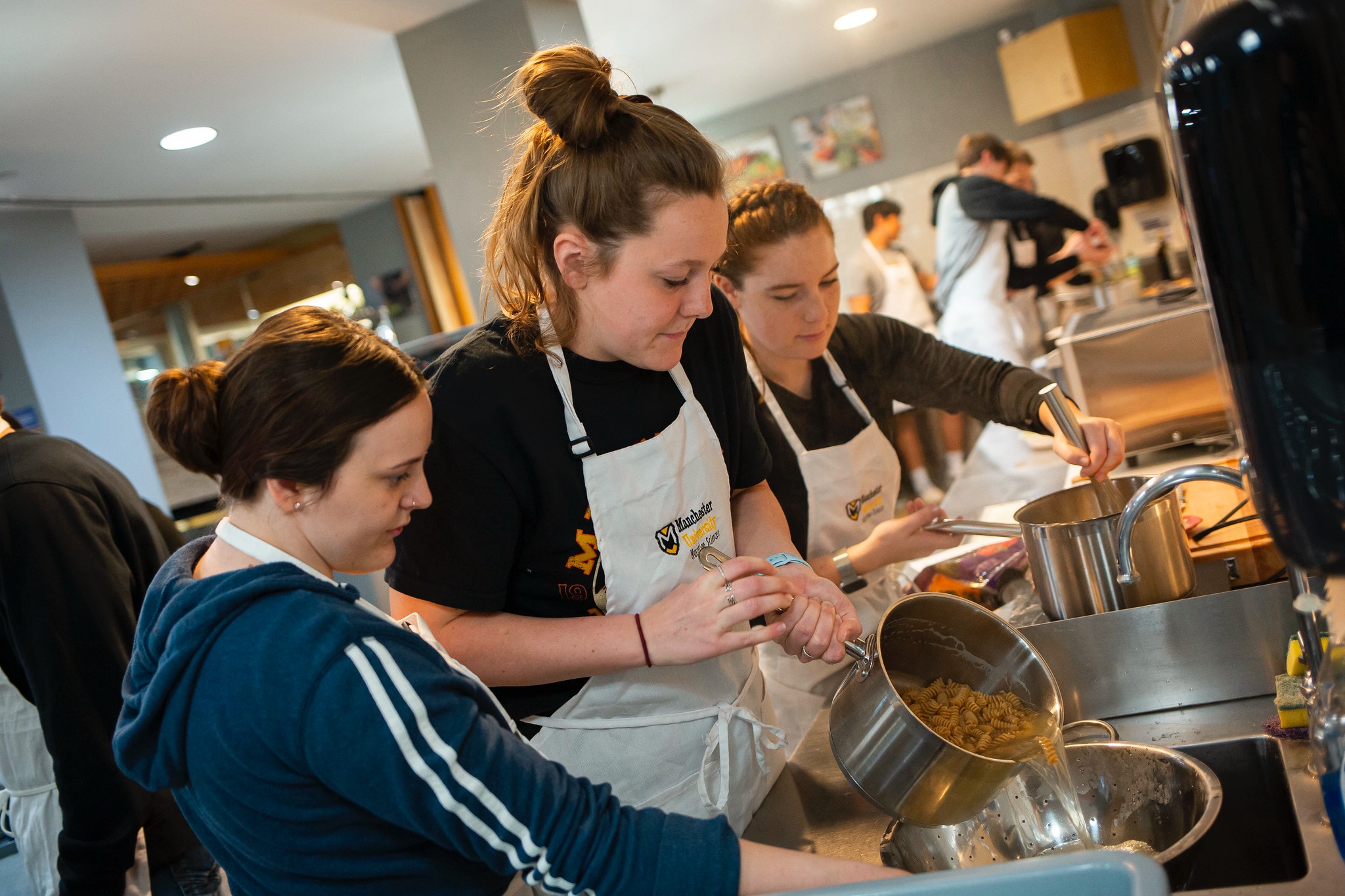Master of Science in Nutrition & Nutrigenomics
Manchester University’s Master of Science in Nutrition and Nutrigenomics (MSNGx) is like no other master’s in nutrition. Our exceptional faculty collaborated to create this cutting-edge, one-of-a-kind degree in nutrition by incorporating traditional training to become a registered dietitian nutritionist (RDN) with genomics.

Nutrigenomics: Where Nutrition Science Meets Genetic Science
What if you could look inside someone’s genetic composition and make recommendations that provide optimal nutrition as well as prevent, treat and manage nutrition-related health conditions? Nutrigenomics allows you to do exactly that.
The MSNGx degree offers fully online courses alongside supervised experiential learning rotations with partner facilities in the student’s home region. Manchester University’s Master of Science in Nutrition and Nutrigenomics has been granted candidate status by the Accreditation Council for Education in Nutrition and Dietetics of the Academy of Nutrition and Dietetics.
Accreditation Council for Education in Nutrition Dietetics (ACEND)
120 Riverside S Plaza, #2190, Chicago, IL 60606
(312) 899-0040 ext 5400
Program Information:
Master of Science in Nutrition & Nutrigenomics (MSNGx)
- 54 Credit Hours
Location
- Fort Wayne
- Online
Mission Goals and Objectives
Program Mission Statement:
To graduate practice-ready Registered Dietitian Nutritionists dedicated to improving the lives of those in the community with cultural humility, forward-thinking, and personalized, collaborative patient-centered care.
Program Goals and Objectives
Goal #1 – Graduates will be practice ready to deliver high-quality personalized nutrition care and services that enhance the health and wellbeing of all populations.
- Of graduates who seek employment, at least 70% are employed in nutrition and dietetics or related fields within 12 months of graduation.
- Of respondents to the post-graduation survey, 80% or more of employers will report at least satisfaction with the preparation of the entry-level registered dietitian nutritionist.
- 80% or more of graduates, who respond to the post-graduation survey, will report at least satisfaction in being practice ready to provide personalized nutrition services to enhance health.
Goal #2 – Graduates will demonstrate advanced knowledge and skills that meet the nutritional needs of individuals through evidence-informed patient-centered personalized holistic care.
- At least 80% of students complete program requirements within 3 years (150% of the program length).
- At least 80% of program graduates take the CDR credentialing exam for dietitian nutritionists within 12 months of program completion.
- The program’s one-year pass rate (graduates who pass the registration exam within one year of first attempt) on the CDR credentialing exam for dietitian nutritionists is at least 80%.
- 80% or more of graduates who respond to the post-graduation survey will report at least occasionally using evidence-informed research during patient care.
Student outcomes data are available upon request.
Harness Genomics to Personalize Nutrition Care
Nutritional genomics is a part of nutrition assessment in clinical practice. It helps you understand, interpret and communicate complexities when the actual risk of developing a disease is not known. In our MSNGx Program, you’ll learn how to use genomics to thoroughly assess clients and use an evidence-based approach to individualize recommendations that result in the best health outcomes. The value of a master’s in nutrition and nutrigenomics cannot be overstated.
W. Thomas Smith, Dean of School of Pharmacy


Why Choose MU for Your Masters Degree?

Supervised Experiential Learning
Starting your first year, you’ll apply the Nutrition Care Process to provide medical nutrition therapy and nutrition care in a variety of settings including community nutrition programs, schools, healthcare systems, private practice, and agricultural associations.
Unparalleled faculty
The MSNGx faculty are experts in their field. They bring experience in dietetics practice, medical informatics, food systems management, research, and genetics. Places faculty have worked include: clinical, long-term care, sports, military and veteran’s affairs, community health, and corporate wellness.
Superior technology
The program introduces you to modern analytical techniques used to evaluate DNA, RNA and protein collection, isolation, preparation and analysis. Students have the option to attend a one-week in-person genomics lab. If you’d like to join us, you’ll have access to laboratory genetic sequencing instruments such as MassARRAY and QuantStudio Plus
What You Can Do With Your Nutrition & Nutrigenomics Master’s
Registered Dietitian Nutritionist
Provide nutrition-related care including counseling and education
Registered Dietitian Nutritionists (RDNs) are the experts in food and nutrition in all facets of the health care, public health and wellness industries. https://www.eatright.org/become-an-rdn
You will focus on preventing, treating and managing health conditions, improving food systems and public health, and work with specialized groups like helping athletes achieve peak performance.
Dietitians work in hospitals, clinics, private practice, public health, sports nutrition, food and nutrition-related businesses, schools, and foodservice systems.

Average Starting Salary for Master of Science in Nutrition and Nutrigenomics Graduates
According to the U.S. Bureau of Labor Statistics (BLS), roles for nutritionists and dietitians are expected to grow 7 percent through 2031.
The U.S. Bureau of Labor Statistics reports $71,280 as the median salary for an RDN. MU’s unique nutrigenomics component enhances your marketability further.

Admissions Requirements and Application Process
Requirements
To be considered for admission to the MSNGx Program*, candidates must:
- Possess a bachelor’s degree from a regionally accredited institution
- A minimum cumulative GPA of 2.7 is preferred on a 4.0 scale
- Successfully complete all prerequisite coursework a “C” letter grade or better at an accredited institution.
* International Students are not eligible to apply to the MSNGx Program. Manchester University’s Master of Science in Nutrition & Nutrigenomics Program does not have approval from Homeland Security to accept international students.
Applications for admission are accepted through March 1 each year. Application materials are to be submitted through DICAS.
A completed DICAS application is required to be considered for admission (an essay, report all institution(s) attended on the DICAS application and request all transcript(s) be sent directly from the institution(s) to DICAS). Applicants who studied outside the U.S. will be required to order a course-by-course foreign credit evaluation report from World Education Services (WES) indicating the US degree equivalency for each international institution attended and have it sent directly to DICAS.
Course Equivalencies
To be sure the courses from your college or university satisfy prerequisite requirements for admission to Manchester, see the course equivalency chart for each of the following institutions. If your institution is not in this list, you may direct questions regarding coursework to the Office of Graduate Admissions or call 260-470-2703.
Prerequisite Courses
- Human Physiology
- General Chemistry with lab
- Microbiology with lab
- Biochemistry with lab
- Macronutrient metabolism
- Micronutrient metabolism
- Food preparation with lab
Program accepts verification from an ACEND accredited Didactic Program in Dietetics (DPD) program OR completion of the program prerequisites prior to matriculation
Annual Requirements
Students are required to complete the following items at an additional cost, yearly.
- Vaccines and immunizations
- Criminal background check, which includes identity verification
- Drug screen
- Health insurance coverage
Technology Requirements
Students must have reliable access to the following technology:
- Microsoft Office suite of products.
- Internet
Essay
Application Process
Application materials are to be submitted through the Dietetics Inclusive Central Application System (DICAS). DICAS charges $50 for the first program you apply to and $25 for each additional program.
U.S. Citizens who earned their degree(s) outside the United States must submit all relevant documentation to World Education Services, Inc. (WES) for evaluation and interpretation. Students should request that WES perform a course-by-course evaluation, and they should have a report sent directly to DICAS. Students are responsible for payment of fees to WES (not Manchester University) for this service.
Apply
Must apply by March 1
Please check all admissions requirements before applying with DICAS.
Credit for Prior Learning Policy
View the full Policy here: Credit for Prior Learning SEL Policy

Curriculum
Some of the coursework of your degree in nutrition and nutrigenomics include:
- Lifecycle Nutrition and Disease
- Nutrition Informatics
- Human Genetics
- Medical Nutrition Therapy
- Research Methods
- Nutrition and Omics
View all courses of MU’s Master of Science in Nutrition and Nutrigenomics Program.

Year 1
Semester 1 Coursework | 13 Credits | Fall
- NUTN 505 – Lifecycle Nutrition & Disease | 3 credits
- Prerequisites: none
- NUTN 510 – Nutrition Assessment | 3 credits
- Prerequisites: none
- NUTN 515 – Nutrition Informatics | 3 credits
- Prerequisites: none
- NUTN 520 – Community Nutrition | 3 credits
- Prerequisites: none
- NUTN 576 – Supervised Experiential Learning Seminar | 1 credit
Semester 2 Coursework | 12 Credits | Spring
- NUTN 521 – Human Genetics | 4 credits
- Prerequisites: none
- NUTN 525 – Food Systems Management | 3 credits
- Prerequisites: none
- NUTN 535 – Medical Nutrition Therapy 1 | 3 credits
- Prerequisites: NUTN 505, NUTN 510
- NUTN 540 – Nutrition Counseling & Ethics | 2 credits
- Prerequisites: NUTN 505, NUTN 510, NUTN 515
Semester 3 Coursework | 7 Credits | Summer
- NUTN 533 – Biostatistics | 3 credits
- NUTN 610 Supervised Experiential Learning – Community | 2 credits
- Prerequisites: NUTN 520, NUTN 535, NUTN 540
- NUTN 620 – Supervised Experiential Learning – Business | 2 credits
- Prerequisites: NUTN 520, NUTN 535, NUTN 540
Year 2
Semester 4 Coursework | 12 Credits | Fall
- NUTN 635 – Medical Nutrition Therapy & NGx | 3 credits
- Prerequisites: NUTN 535
- NUTN 630 – Supervised Experiential Learning – Food Service Management | 4 credits
- Prerequisites: NUTN 525
- NUTN 640 – Supervised Experiential Learning – Sustainability | 2 Credits
- Prerequisites: NUTN 525
- NUTN 670 – Research Methods | 3 credits
- Prerequisites: NUTN 533
Semester 5 Coursework | 11 Credits | Spring
- NUTN 645 – Nutrition & Omics | 2 credits
- Prerequisites: NUTN 521, NUTN 535
- NUTN 672 – Capstone | 3 credits
- Prerequisites: NUTN 670
- NUTN 650 – Supervised Experiential Learning – Long-term Care | 2 credits
- Prerequisites: NUTN 635
- NUTN 660 – Supervised Experiential Learning – Clinical | 4 credits
- Prerequisites: NUTN 635
PGx/NGx 592: Laboratory Techniques Intensive Information

What you will learn
This one-credit-hour, on-campus laboratory course introduces modern analytical techniques commonly used for DNA, RNA, and protein collection, isolation, preparation and analysis. Students will have the opportunity to actively engage in laboratory processes associated with pharmacogenomics. The course is one week in length and students will work for 40 hours during the week.
Techniques
- Laboratory Safety
- Accuracy and Precision in Pipetting
- Conversions and Dilutions
- DNA, RNA, and Protein Extraction and Quantification
- PCR and RT-PCR Techniques
- Cell Culture
- Western Blotting
- Open Array Sequencing
- Translational Software
Logistics
- Course is offered during spring break.
- Monday – Friday, 8 a.m. – 5 p.m.
- Elective course offering for in the Master of Science in Pharmacogenomics and the Master of Science in Nutrition and Nutrigenomics Program
- Prerequisites: none
Meals
- Breakfast: Most hotels offer continental as part of the room rate
- Lunch: Provided on-site by the class
- Dinner: On your own
Tuition & Fees
| PGx/NGx 592 (1 CH): Lab Techniques Intensive | Costs |
| Tuition | $935 |
| Fees | *$530 |
*This course includes an additional laboratory fee.
Travel and Hotel
MUFW has an agreed rate for students at these four surrounding hotels and students are encouraged to use the links below:
- Hilton Garden Inn Fort Wayne North – $129
- Home2 Suites by Hilton Fort Wayne North –$119
- Hampton Inn Ft. Wayne Dupont Road –$89
- Comfort Suites North Fort Wayne –$79
Staff
Ann Savariar, MS
Kelly St. John-Pikel, MS
Competency Based Education
The MSNGx program is a Graduate Program (Future Education Model) competency-based education (CBE) program. This program is focused on student mastery of the competencies and performance indicators set forth by the Accreditation Council for Education in Nutrition and Dietetics (ACEND). ACEND states that “One of the advantages of CBE is that it fosters work readiness.
In the Graduate Program Accreditation Standards, the curriculum is guided with the competencies and their respective performance indicators, which are clearly defined based on the desired behaviors and job skills targeted.”
Competency based programs focus on students progress toward achieving required competencies rather than hours as in traditional time-based programs. CBE encourages students to drive their education progression. Faculty therefore become facilitators of student-led learning.
View the Academic Calendar for more dates and information.

Experiential Learning – Sites, Requirements and Preceptors
Sites
Fort Wayne, Indiana Based Students
The MSNGx Program Director will identify preceptors and arrange placement of students at supervised experiential learning (SEL) facilities within a 1 hour or 150-mile radius of Fort Wayne. Students selecting this option are required to live in the Fort Wayne area regardless of where the student resides at the time of application to the program.
Distance Learning Students
Students identify and contact preceptors/facilities in the area of residence or preferred location. Students may complete supervised experiential learning at facilities anywhere in the United States, so long as they meet the minimum requirements. Distance learning applicants must include commitment letters from preceptors for the clinical rotation before admission to the program will be granted. MU must establish affiliation agreements with student selected facilities prior to student placement. We have put together this toolkit to help you start searching for preceptors in your preferred geographical area.
Requirements - Rotations
Clinical Shadow | Spring | 80 Hours
- 1 day per week for approximately 10 weeks
- Preceptor must be an RDN
Ideally, this preceptor will also be the preceptor for the Clinical rotation during the final semester.
Facility should:
- Be accredited by the appropriate agency (such as The Joint Commission or the state)
- Be in good standing
- Have at least 2 RDNs providing MNT
- Be licensed for at minimum 50 bed inpatient census
Community | Summer | 128 Hours
- Minimum 128 hours, approximately 4 weeks
- Preceptor may be an RDN, MPH, lactation specialist, or other approved professional
- Facility may be WIC, health department, aging services, child nutrition program, community wellness, correction facilities, or other community agency/facility providing nutrition education
Business | Summer | 128 Hours
- Minimum 128 hours, approximately 4 weeks
- Preceptor is preferably an RDN, but may be another healthcare professional
- Facility may be private nutrition practices, corporate wellness, sports nutrition, or other approved businesses
Food Service Management | Fall II | 224 Hours
- Minimum 224 hours, approximately 7 weeks
- Preceptor is preferably an RDN, but may be a food service manager or supervisor
- Facility may be hospital, long term care, K-12 school, University, or other large scale food service operation
Sustainability/Agricultural Foods | Fall II | 128 Hours
- Minimum 128 hours, approximately 4 weeks
- Preceptor is preferably an RDN, but may be an MPH, or other sustainable agriculture specialist
- Facility may be a farmer’s market program, farm to table program, sustainable/regenerative farm, or other approved site
Long Term Care | Spring II | 96 Hours
- Should be accredited by the appropriate agency (such as The Joint Commission or the state) and be in good standing.
- Preceptor should be an RDN.
Faculty should:
- Be accredited by the appropriate agency (such as and be in good standing
- Be licensed for at minimum 50 bed inpatient census
- Have opportunities such as skilled nursing, assisted living, rehab, MDS, and billing
Clinical | Spring II | 256 Hours
- Minimum 256 hours, approximately 8 weeks
- Preceptor must be an RDN
- Ideally, this preceptor is the same as the Clinical Shadow preceptor from Spring 1
Facility should:
- Be accredited by the appropriate agency (such as The Joint Commission or the state) and be in good standing
- Have at least 2 RDNs providing MNT
- Be licensed for at minimum 50 bed inpatient census
- Have opportunities such as med/surg, cardiac, gastrointestinal, oncology, ICU, NICU, management, and formulary
Preceptors
Commitment Letters
- Contact potential preceptors. Start with individuals you have already met in class as guest speakers, at meetings, facilities you have volunteered in, or connect on social media (i.e. LinkedIn).
- Obtain a commitment letter from individuals that states their preparedness to precept you. Letters may be in the preceptors preferred format (letter, email, etc.) but you must provide copies of letters in PDF format to the Program Director. (Commitment letters for Clinical rotations must be submitted prior to admittance in the program. Inclusion of other rotation commitment letters is not required but will support your application.)
- Samples of preceptor commitment letters can be found in this toolkit.
- Students selecting their own supervised experiential learning sites must locate their clinical site and have a letter of commitment prior to acceptance in the program. This may be done after applying to the program. Clinical sites must have a Registered Dietitian Nutritionist (RDN) as the primary preceptor for the student. If you are a member of the Academy of Nutrition and Dietetics you may search the Preceptor Database.
Before Experiential Learning May Begin
- Affiliation agreements are required before supervised experiential learning may begin.
- Agreements will be completed between Manchester University and the practice site/facility. In the event that an affiliation agreement is unable to be negotiated, you will be responsible for finding another preceptor and site to complete required supervised experiential learning.
Graduation and Program Completion Requirements
To earn the Master of Science in Nutrition and Nutrigenomics degree and Verification Statement, the student must:
- Complete all required didactic graduate courses and supervised experiential learning courses and maintain a cumulative GPA of 3.0 or higher.
- Earn at least a 2.00 (C) in each required course.
- Pass all supervised experiential learning rotations with a “4” or above for each required competency.
- Perform in an ethical and professional manner.
- Program requirements must be completed within 5 years of commencement of the program.
Graduation information is available in the Manchester University Academic Catalog. Additional information regarding graduation may be obtained from the Registrar’s Office.


Credentialing Exam to Become an RDN
Credentialing Exam
Effective January 1, 2024, the Commission on Dietetic Registration (CDR) will require a minimum of a master’s degree to be eligible to take the credentialing exam to become a registered dietitian nutritionist (RDN). In addition, CDR requires that individuals complete coursework and supervised practice in program(s) accredited by the Accreditation Council for Education in Nutrition and Dietetics (ACEND). In most states, graduates also must obtain licensure or certification to practice. Graduates who successfully complete the ACEND-accredited graduate program at Manchester University are eligible to apply to take the CDR credentialing exam to become an RDN.
Learn more information about educational pathways to become a RDN.
Licensure and Professional Regulation of Dietitians
AL, AK, AR, CA, CO, CT, DE, DC, FL, GA, HI, ID, IL, IA, KS, KY, LA, ME, MD, MA, MN, MS, MO, MT, NE, NH, NJ, NM, NY, NC, ND, OH, OK, OR, PA, RI, SC, SD, TN, TX, UT, VT, VA, WA, WV, WI, WY, PR.
As of August 2021, Arizona and Michigan do not have licensure of practice or title regulations. Students should review licensure requirements for any state where they plan to practice. More information can be found at the Academy of Nutrition and Dietetics Licensure.
Meet the Faculty

Costs and Financial Aid
The cost of attendance is designed to provide students with an accurate projection of reasonable cost associated with attending Manchester University. The cost of attendance reflects reasonable cost that a typical student with a modest lifestyle may incur to attend the University. The cost of attendance does not represent a student’s actual charges/experience. The exact cost will vary.

Non-Discrimination in the Admission Process
Manchester University is committed to non-discrimination in campus life. The University does not discriminate on the basis of national origin, ancestry, race, color, age, sex, gender identity or expression, sexual orientation, familial status, religion, disability or veteran status in admissions or any area of campus life, including its educational programs, scholarships and loan awards, residence life programs, athletic programs, extracurricular programs, promotion and tenure policies and practice, and alumni affairs.
Manchester University is committed to carry out the provisions of Section 504 of the Rehabilitation Act of 1973 and the Americans With Disabilities Act, which provide for accessibility of University programs to the physically disabled.






